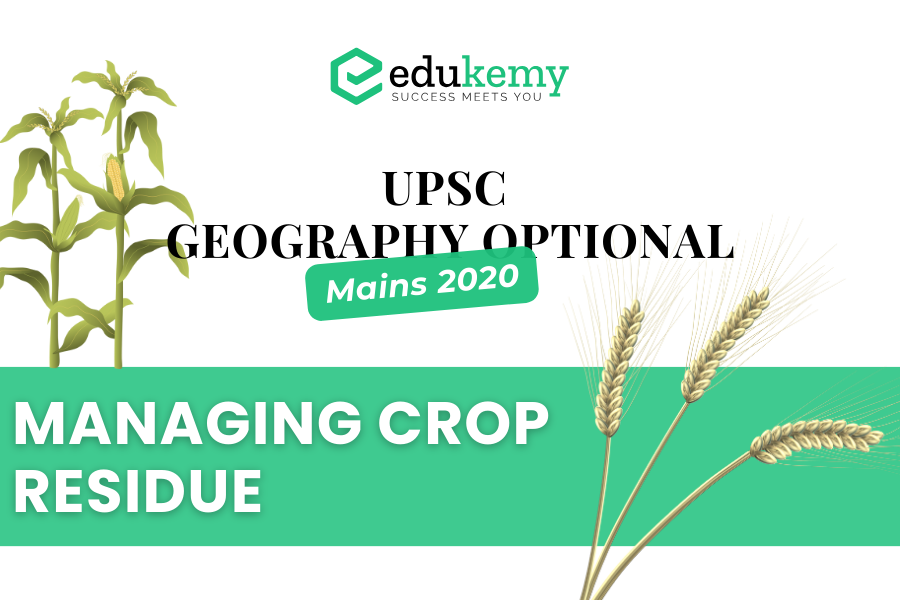
In rural India, managing crop residue—such as leftover stalks and straw after harvest—is crucial for reducing pollution. Traditionally, farmers often burn this residue to clear their fields quickly, but this practice generates a lot of smoke and harmful pollutants, contributing to air pollution and health problems. To tackle this, several eco-friendly methods are being promoted. One effective approach is converting crop residue into compost, which enriches the soil and reduces the need for chemical fertilizers. Another method is using residue as animal fodder or for bioenergy production, such as biogas, which provides a sustainable energy source. Additionally, new technologies like Happy Seeder machines can plant seeds directly through the residue without needing to clear it, thus avoiding burning. Government initiatives and awareness programs are also helping farmers adopt these sustainable practices, leading to cleaner air and healthier communities.
Contents
Introduction:
Crop residue management refers to the handling and utilization of the remnants of harvested crops, such as straw, stalks, and leaves. Proper management of these residues is essential to prevent pollution, improve soil health, and enhance agricultural
sustainability. In rural India, traditional practices like burning crop residues lead to severe air pollution and health hazards. Therefore, adopting sustainable residue management methods is vital.
Body:
Method of crops residue management in rural India:
- In-Situ Incorporation
○ Description: Plowing the crop residues back into the soil.
○ Example: Farmers in Punjab and Haryana use Happy Seeders, a tractor-mounted machine that cuts and spreads the straw evenly as mulch while sowing seeds for the next crop. This method enriches the soil with organic matter and nutrients. - Composting
○ Description: Converting crop residues into compost through aerobic decomposition.
○ Example: In regions like Karnataka, farmers are trained to create compost pits where they can decompose crop residues into organic fertilizer, improving soil fertility and reducing waste. - Mulching
○ Description: Using crop residues as a protective cover over soil.
○ Example: Farmers in Tamil Nadu practice mulching with paddy straw to conserve soil moisture, suppress weeds, and improve soil structure, leading to better crop yields and reduced need for chemical inputs. - Biochar Production
○ Description: Converting crop residues into biochar through pyrolysis.
○ Example: In rural areas of Maharashtra, biochar production units have been set up where farmers can process their crop residues. Biochar is used to enhance soil health and sequester carbon, thus contributing to climate change mitigation. - Livestock Fodder
○ Description: Utilizing crop residues as animal feed.
○ Example: In Gujarat, surplus crop residues like wheat and rice straw are used as fodder for livestock, providing a cost-effective feed source and reducing residue burning. - Biogas Production
○ Description: Converting crop residues into biogas for energy.
○ Example: Biogas plants in rural Uttar Pradesh utilize crop residues along with animal dung to produce biogas for cooking and electricity, reducing reliance on fossil fuels and mitigating pollution. - Paper and Pulp Industry
○ Description: Using crop residues as raw material for the paper industry.
○ Example: Agro-based industries in West Bengal process rice straw and wheat straw to manufacture paper and cardboard, offering a sustainable alternative to wood-based raw materials. - Collaborative Farming Practices
○ Description: Encouraging community-level initiatives for residue management.
○ Example: Cooperative societies in Madhya Pradesh organize collective efforts to manage crop residues, such as sharing machinery for residue incorporation and pooling resources for composting units.
Conclusion:
Future initiatives should focus on providing farmers with access to advanced machinery, training programs, and financial incentives to adopt these methods. Research and development in innovative residue management technologies, coupled with strong policy support, can pave the way for a cleaner, more sustainable agricultural future in India.
In case you still have your doubts, contact us on 9811333901.
For UPSC Prelims Resources, Click here
For Daily Updates and Study Material:
Join our Telegram Channel – Edukemy for IAS
- 1. Learn through Videos – here
- 2. Be Exam Ready by Practicing Daily MCQs – here
- 3. Daily Newsletter – Get all your Current Affairs Covered – here
- 4. Mains Answer Writing Practice – here

